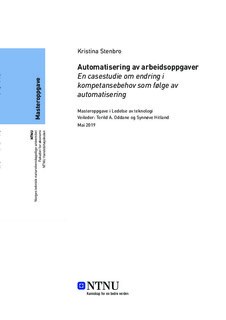| dc.contributor.advisor | Hitland, Synnøve | |
| dc.contributor.advisor | Oddane,Torild A. | |
| dc.contributor.author | Stenbro, Kristina | |
| dc.date.accessioned | 2019-09-17T14:00:51Z | |
| dc.date.available | 2019-09-17T14:00:51Z | |
| dc.date.issued | 2019 | |
| dc.identifier.uri | http://hdl.handle.net/11250/2617279 | |
| dc.description.abstract | Den teknologiske utviklingen har medført at kompetanse er blitt et stadig mer sentralt konkurransefortrinn. Hvordan arbeiderens kompetanse kan endres og utvikles for å holde tritt med denne utviklingen settes derfor på dagsorden. Innen industrien gjenspeiles den teknologiske utviklingen ofte med automatisering av arbeidsoppgaver. Denne studien setter fokus på endring i kompetansebehov som følge av automatisering, noe som også er etterspurt informasjon fra Kunnskapsdepartementet. Studiens problemstilling er formulert som følger: Hvordan endres operatørenes kompetansebehov som følge av automatisering av arbeidsoppgaver ved Støren Treindustri AS?
For å besvare denne problemstillingen er det utført en kvalitativ studie med Støren Treindustri AS som casebedrift, der operatørenes kompetanse er blitt studert. Datainnsamlingen har foregått i form av intervjuer, samt noen observasjoner. Teori vedrørende automatisering som en endringsprosess, kompetanse og kompetanseutvikling, samt læringsteori danner det teoretiske rammeverket.
Studien støtter seg blant annet på Schiefloe (2003) sin modell for teknologiske endringsprosesser og viser hvordan en endringsprosess fullføres gjennom at aksepten for ny kunnskap medfører en atferdsendring. Dette styrker viktigheten av kompetanseendring i endringsprosesser, som ved automatisering. Videre benyttes Polanyi (1967) sin teori om taus kunnskap og Nonaka og Takeuchi (1995) teori om kunnskapsutvikling til å styrke studiens funn for hvordan operatørenes kompetanse endres og utvikles som følge av automatisering.
Det trekkes frem fem hovedelementer som svarer på problemstillingen for hvordan kompetansebehovet endres som følge av automatisering. Disse er; redusert fagområde, økt data/ IT-kunnskaper, økt logisk tenkning og planlegging, økt samarbeidsevne og mindre grad av kreativitet. Drøftingen viser imidlertid også at automatiseringen skal ha medført en økning i taus kunnskap. Dette skaper en større usikkerhet knyttet til arbeidet med kartleggingen av operatørenes kompetanse og det antas at mye kompetanse ikke er blitt fanget opp i datainnsamlingen. Casebedriften oppfordres derfor til å jobbe med eksternalisering av taus kunnskap, slik at denne blir eksplisitt og lettere kan kartlegges. | |
| dc.description.abstract | The technological development has made competence to an important competitive advantage. How the worker’s competence changes and develops in order to keep pace with this development is therefore put on the agenda. In the industry technological development often gets associated with automation of work tasks. This study focuses on changes in needs of competence as a result of automation. This also concerns requested knowledge by the Norwegian Department of Knowledge. The main task of this study is to find answer to how the operators needs of competence changes as a result of automation at Støren Treindustri AS.
In order to find answers on this, a qualitative case study on Støren Treindustri AS has been done. Here, the operators working in the factory and their competence has been studied. The collection of data is based on interviews, as well as some observations. Theories regarding automation as a changing process, competence and competence development and learning makes the theoretical framework.
This study supports Schiefloe’s (2003) model, showing how changing processes gets completed by the acceptance of new knowledge leading to a change in behaviour. This strengthens the importance of competence developement in changing processes, such as automation. Furthermore, Polanyi’s (1967) theory on the tacit knowledge and Nonaka & Takeuchi´s (1995) theories regarding knowledge development, contributes to strengthen these study findings on how the operators needs of competence changes as a result of automation.
Five main elements make the main response to this study’s task regarding mapping the change in needs of competence. These are; reduced area of subject, increased data/ IT skills, increased use of logical thinking and planning, increased collaboration ability and a less degree of creativity. However, the discussion also shows how automation in general has led to an increased tacit knowledge. This leads to an uncertainty related to the work of mapping the operator’s competence, and it is suspected that a significant amount of data has not been captured. Therefore, it is required that the company in this case needs to work with externalization of its tacit knowledge. | |
| dc.language | nob | |
| dc.publisher | NTNU | |
| dc.title | Automatisering av arbeidsoppgaver: En casestudie om endring i kompetansebehov som følge av automatisering | |
| dc.type | Master thesis | |
